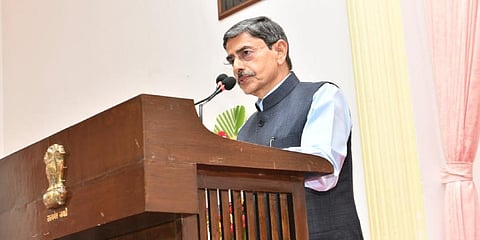

CHENNAI: In a significant escalation in the tussle between Tamil Nadu Governor RN Ravi and the DMK government, the state has moved the Supreme Court over inordinate delay by the governor in giving assent to bills passed by the Tamil Nadu Assembly and clearing of files relating to key decisions taken by the state government.
The state has asked the court to fix an outer time limit for the governor to decide on bills passed by the legislature and has sought a direction to the governor to dispose of bills, files, and orders sent to his office by the Tamil Nadu Legislative Assembly and the government within that timeframe.
“The governor has positioned himself as a political rival to the legitimately elected government by hindering and obstructing the Legislative Assembly’s ability to carry out its legislative duties by unjustly and excessively delaying the consideration of bills passed by the Assembly,” said the state government’s petition filed before the Supreme Court.
While West Bengal, Punjab, and Telangana governments have already moved the Supreme Court against their respective state governors over various disputes, the Kerala government has also announced its decision to move the top court against its governor.
Tamil Nadu told the court that the governor’s inaction has led to a constitutional deadlock between the constitutional head of the state and the elected government. “By not acting on his constitutional responsibility, the governor is toying away with the citizen’s mandate.
In view of the attendant circumstances, the petitioner has no other alternate or efficacious remedy except to file the present writ petition by invoking Article 32 of the Constitution,” the state said in its plea. The petition said the governor’s refusal to act on the ‘aid and advice of the council of ministers’ and deliberate inaction in deciding on bills and files will defeat parliamentary democracy and the will of the people and violate the basic structure of the Constitution. The governor is demonstrating an adversarial attitude by not cooperating with the state administration, the plea said.
Governor bringing entire admin to grinding halt, says state govt
In its petition, the government also said that by not signing remission orders, day-to-day files, and appointment orders, and by refusing to grant approval to recruitment orders and prosecution of ministers and MLAs in corruption cases, including transfer of investigation to the CBI, the governor is bringing the entire administration to a grinding halt.
Giving a list of bills that have not been assented to by the governor, the petition said a majority of these bills pertain to amending of statutes of universities with respect to curtailing of powers of the governor in appointment of vice-chancellors to these universities and vesting of those powers with the state government.
“The governor is abusing his office by interfering with the law-making powers of the legislature and by stalling the depletion of powers of his own office by not acting upon the bills passed by the legislature to replace him from the post of chancellor in all the universities in the state of Tamil Nadu,” the petition said. Besides, the petition also recalled how the governor returned the files relating to the appointment of the chairman and members of the Tamil Nadu Public Service Commission (TNPSC) for the second time.
The governor has failed to accord sanctions for the prosecution and investigation of various crimes of corruption involving the moral turpitude of public servants and issues pertaining to the premature release of prisoners. The petition also pointed out that though Article 200 does not specifically fix any time limit for the governor to clear the bills, it uses the phrases “shall declare” and “as soon as possible” indicating the urgency and the haste with which the governor must act. Nowhere in Article 200 or in the Constitution is the power of the governor to “sit over the bills enacted by the State Legislature” contemplated, the state told the court.